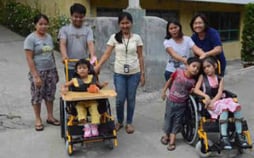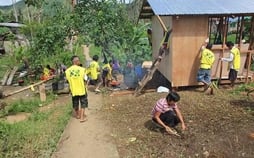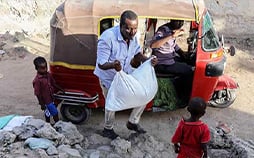Helping Babies Breathe
February 2014
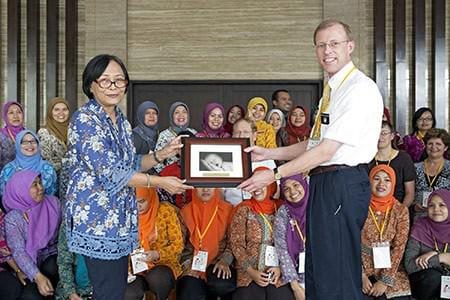 Dr. Visick presents a gift to Dr. Eriyati at the Helping Babies Breathe graduation of the first class of midwives in Bandung, Indonesia. A total of 600 midwives will be trained during the next six months.
Dr. Visick presents a gift to Dr. Eriyati at the Helping Babies Breathe graduation of the first class of midwives in Bandung, Indonesia. A total of 600 midwives will be trained during the next six months.
It’s a much-needed approach to saving newborn babies - two volunteer physicians and a registered nurse journey from the United States to Bandung, Indonesia, to train 20 local physicians in newborn resuscitation. But what difference can they possibly make when an overwhelming 900,000 babies die each year because they can’t breathe at birth? The difference comes when three trainers train 20 who in turn train 600 more.
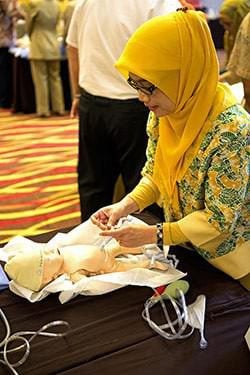 A midwife practices tying the umbilical cord on a baby simulator. It is one of several skills learned in the two-day course presented by LDS Charities volunteers, Perinasia, and local physicians.
A midwife practices tying the umbilical cord on a baby simulator. It is one of several skills learned in the two-day course presented by LDS Charities volunteers, Perinasia, and local physicians.
“There are 21 million people in West Java,” said Dr. Reby Kusumajaya, a pediatrician from Cicalengka Hospital in Bandung. “Most baby care in Indonesia is done by midwives. Their confidence is low due to limited training and resources. Volunteers from LDS Charities help change that by introducing proper procedures and training with the instruments they provide.”
“Our trained volunteers work side by side with local physicians and nurses,” said Dean Walker, manager of neonatal resuscitation training for LDS Charities. “They in turn train local midwives to provide lifesaving skills.”
While LDS Charities is recognized for its “train the trainer” approach to neonatal resuscitation training, it further multiplies its reach by joining forces with like-minded organizations. In Indonesia, that partner is Perinasia. This organization of neonatologists, obstetricians, and pediatricians has a 16-year history of teaching neonatal resuscitation to medical professionals.
The scope of the training has expanded thanks to a new program called Helping Babies Breathe (HBB). Unlike the more advanced training provided for physicians in a hospital setting, HBB focuses on midwives in a clinic or rural setting.
Why the new direction? In West Java alone, it is estimated that just 30 percent of births occur in a medical facility. One in four babies dies at birth from being unable to breathe. Precious life is lost, and needlessly so in many cases.
The HBB program, developed by the American Academy of Pediatrics with input from LDS Charities and others, emphasizes skilled attendance at birth, assessment of every baby, temperature support, stimulation to breathe, and assisted ventilation as needed, all within “The Golden Minute” after birth.
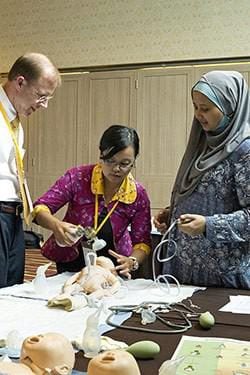 Dr. Michael Visick (Logan, Utah) oversees an individual practical examination of skills learned by midwives. The Helping Babies Breathe course was conducted in Bandung, Indonesia.
Dr. Michael Visick (Logan, Utah) oversees an individual practical examination of skills learned by midwives. The Helping Babies Breathe course was conducted in Bandung, Indonesia.
“HBB has produced exciting results for a program that’s only been out for three years,” said Dr. Michael Visick, an LDS Charities short-term specialist who was assigned to the HBB project in Bandung. “Published results in Tanzania show that in three years HBB reduced the infant mortality rate by 47 percent. That’s huge! We’re hoping to see similar results in other countries.”
Proper training is crucial and requires careful planning and implementation. Dr. Dennis Hughes, a retired obstetrician from Salt Lake City, Utah, knows that firsthand. He was medical director of the HBB program in Bandung and served as a specialist in neonatal resuscitation training for three years on four continents. He quickly outlined how the training works.
“Once an Area Presidency determines a location, technical specialists such as my wife and I are assigned to a project,” said Dr. Hughes. “We contact the humanitarian missionaries and other officials in a country to learn what’s been done in the past. Then we visit government health officials and talk about benefits and requirements of the NRT or HBB program. We find out what is wanted and the specific location of greatest need.”
Once LDS Charities is connected with the ministry of health, the next step is to “identify and work with a champion,” said Dr. Hughes. “It may be a local physician or official who is passionate about NRT and who will make sure the results are realized.”
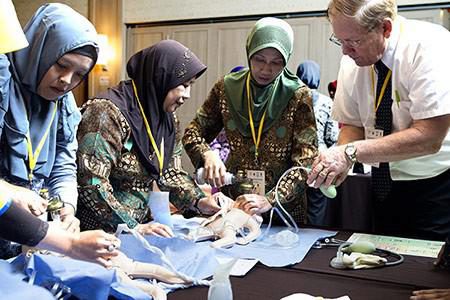 Dr. Dennis Hughes (Salt Lake City, Utah) conducts a progress review with a small group of midwives to determine their progress in learning neonatal resuscitation skills.
Dr. Dennis Hughes (Salt Lake City, Utah) conducts a progress review with a small group of midwives to determine their progress in learning neonatal resuscitation skills.
Finally, a detailed project plan is written and submitted to Church headquarters for approval. Then the training, follow-up, and evaluation are implemented.
In Bandung, for example, Dr. Visick, Carolyn Leifer, and Dr. Hughes comprised the LDS Charities medical team. Liz Visick and two humanitarian missionaries - Elder Lonnie and Sister Mary Lucherini from Preston, Idaho - oversaw administrative details.
The doctors and nurse trained 16 Indonesian doctors and four midwives. In turn, the Indonesians trained 60 midwives in four days. Following this model, 600 midwives in West Java will be trained in just six months. Should each midwife save just two babies as a result, the average cost will be $54 per baby. Save more babies, and the costs dip even more.
The HBB training began with a pretest. Each midwife was asked questions to determine current knowledge. Specific techniques were then demonstrated, followed by practical, hands-on experience with baby simulators. At the end of the training, practical and written examinations were given. Each participant received a certificate of completion.
“When we finished the training, we told all 60 midwives that they were going to receive their own ventilator bag and mask, suction device, and stethoscope for their deliveries,” said Dr. Visick. “Everyone cheered and clapped! These midwives are doing home deliveries and do not have their own equipment to resuscitate babies. They were very excited to hear that they would receive this equipment.”
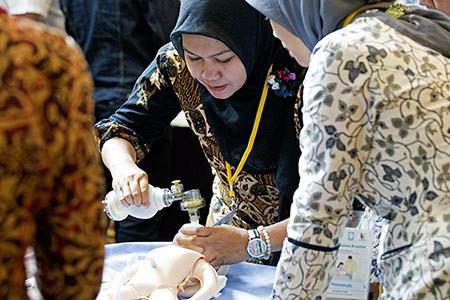 Midwives practice ventilation with a baby simulator. Each midwife receives a ventilator bag, a suction device, and a stethoscope following completion of the Helping Babies Breathe course.
Midwives practice ventilation with a baby simulator. Each midwife receives a ventilator bag, a suction device, and a stethoscope following completion of the Helping Babies Breathe course.
The experience reminded Dr. Visick of how much impact a $50 donation to the Church Humanitarian Fund can make. “That contribution buys two kits and equips two midwives with everything they need to resuscitate babies,” he said. “They may not need it every month, but they’ll be ready when they do. When the midwives cheered at receiving equipment, inside we were cheering, too. We were touched to know the big difference our little sacrifice will make.”
Funds for HBB training come from individual donations to the LDS Humanitarian Fund, through LDS Philanthropies, and from partner organizations in each country. None of the LDS Charities trainers or participants is paid for their involvement.
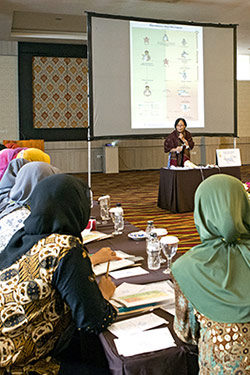 Dr. Eriyati presents an overview of the Helping Babies Breathe course to the first group of 30 midwives. Over the next six months, 600 midwives will be trained in West Java, Indonesia.
Dr. Eriyati presents an overview of the Helping Babies Breathe course to the first group of 30 midwives. Over the next six months, 600 midwives will be trained in West Java, Indonesia.
“LDS Charities has projects all over the world in societies with conditions similar to West Java,” said Sharon Eubank, director of LDS Charities. “Government officials and professionals want to decrease their infant mortality rate. We know how to help. It’s in our experience as a charity. It’s part of our Church history. It’s in our DNA.”
Liz Visick was quick to agree as she noted, “The HBB program has a special place in my heart. Our daughter needed assistance when she was born. Now we are training people to provide the kind of assistance she needed. Our daughter is an incredible person today, and we have had 18 treasured years together. My hope is that, 18 years from now, many mothers in West Java will feel the same joy I feel today.”
“HBB is not the only way to serve,” said Dr. Visick. “We realize that. But it’s one way that we - and any interested person, couple, or family - can help lift burdens and save lives. It’s one way we can reach across the globe and make a difference. We can stand in the stead of the Savior to help relieve the suffering of others.”
To donate to the NRT initiative at LDS Charities,use the button below. One hundred percent of your contribution will help fund future NRT initiatives around the world without regard to race, religion, or ethnic origin.
Give to Humanitarian Aid
 Dr. Visick presents a gift to Dr. Eriyati at the Helping Babies Breathe graduation of the first class of midwives in Bandung, Indonesia. A total of 600 midwives will be trained during the next six months.
Dr. Visick presents a gift to Dr. Eriyati at the Helping Babies Breathe graduation of the first class of midwives in Bandung, Indonesia. A total of 600 midwives will be trained during the next six months.
 A midwife practices tying the umbilical cord on a baby simulator. It is one of several skills learned in the two-day course presented by LDS Charities volunteers, Perinasia, and local physicians.
A midwife practices tying the umbilical cord on a baby simulator. It is one of several skills learned in the two-day course presented by LDS Charities volunteers, Perinasia, and local physicians.
 Dr. Michael Visick (Logan, Utah) oversees an individual practical examination of skills learned by midwives. The Helping Babies Breathe course was conducted in Bandung, Indonesia.
Dr. Michael Visick (Logan, Utah) oversees an individual practical examination of skills learned by midwives. The Helping Babies Breathe course was conducted in Bandung, Indonesia.
 Dr. Dennis Hughes (Salt Lake City, Utah) conducts a progress review with a small group of midwives to determine their progress in learning neonatal resuscitation skills.
Dr. Dennis Hughes (Salt Lake City, Utah) conducts a progress review with a small group of midwives to determine their progress in learning neonatal resuscitation skills.
 Midwives practice ventilation with a baby simulator. Each midwife receives a ventilator bag, a suction device, and a stethoscope following completion of the Helping Babies Breathe course.
Midwives practice ventilation with a baby simulator. Each midwife receives a ventilator bag, a suction device, and a stethoscope following completion of the Helping Babies Breathe course.
 Dr. Eriyati presents an overview of the Helping Babies Breathe course to the first group of 30 midwives. Over the next six months, 600 midwives will be trained in West Java, Indonesia.
Dr. Eriyati presents an overview of the Helping Babies Breathe course to the first group of 30 midwives. Over the next six months, 600 midwives will be trained in West Java, Indonesia.
